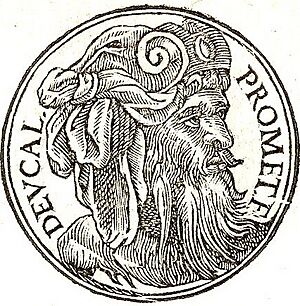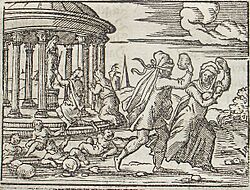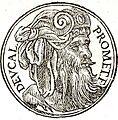Deucalion facts for kids
In Greek mythology, Deucalion was a very important figure. He was the son of Prometheus, a famous Titan who gave fire to humans. Ancient stories say his mother was either Clymene, Hesione, or Pronoia. Deucalion is best known for his role in a huge flood myth in Greek stories, similar to other flood stories around the world.
Contents
What His Name Means
Deucalion's name might come from old Greek words. Some think it means "sweet new wine" or "sweetness" combined with "sailor" or "fisherman." His wife, Pyrrha, had a name that means "flame-colored" or "orange."
His Family
Deucalion was born in a land called Haemonia, which is now Thessaly in Greece. An old poem from the 3rd century BC, called Argonautica, says that Prometheus, son of Iapetus, had Deucalion there. It also says Deucalion was the first to build cities and temples for the gods, and he was the first ruler of people.
Deucalion and his wife, Pyrrha, had several children. According to a book called Bibliotheca, they had at least two children: Hellen and Protogenea. They might have also had a third child named Amphictyon. Another story mentions a daughter named Melanthea (also called Melantho), who later had a son named Delphus with the god Poseidon.
Some of the oldest stories, like the Catalogue of Women, also name daughters Pandora and Thyia, and at least one son, Hellen. Their children and grandchildren were said to have lived and ruled in Thessaly. Other stories mention three more sons: Orestheus, Marathonios, and Pronous. Deucalion also had a son named Candybus, who gave his name to a town in Lycia.
The Great Flood
The most famous story about Deucalion is the great flood. The god Zeus caused this flood because he was very angry. He was upset with a king named Lycaon and his sons. Lycaon had done something terrible: he sacrificed a boy to Zeus. Zeus was horrified by this and decided to end the "Bronze Age" of humans by sending a massive flood. Rivers overflowed, and the sea covered the land, washing everything away.
Deucalion was saved from this flood by his father, Prometheus. Prometheus warned him and told him to build a large wooden chest. Like Noah in the Bible or Utnapishtim in Mesopotamian myths, Deucalion used this chest to survive the huge flood with his wife, Pyrrha.
The most detailed versions of this story come from the Roman poet Ovid (around 1st century BCE) and the Greek writer Apollodorus (1st or 2nd century CE). These stories say that Deucalion, who ruled in a place called Phthia, was warned by Prometheus. He built the chest and filled it with supplies. No animals were saved in this version of the myth. After nine days, the waters went down, and only Deucalion and Pyrrha, who was the daughter of Epimetheus, were left. Their chest landed on Mount Parnassus in Greece. Other stories say it landed on Mount Etna in Sicily, Mount Athos in Chalkidiki, or Mount Othrys in Thessaly.
After the flood, Deucalion and Pyrrha thanked Zeus. Deucalion, who was said to be 82 years old at the time, asked an oracle (a wise priestess) of the goddess Themis how to bring people back to Earth. The oracle told him to "cover your head and throw the bones of your mother behind your shoulder." Deucalion and Pyrrha understood this to mean that "mother" was Gaia, the Earth, who is the mother of all living things. The "bones" were rocks. So, they threw rocks behind their shoulders. The stones Deucalion threw became men, and the stones Pyrrha threw became women. These new people were sometimes called the Leleges. This story explains how humans came back to Earth after the great flood.
Other Stories About Deucalion
There are some other less common stories about Deucalion. One writer, Dionysius of Halicarnassus, said Deucalion's parents were Prometheus and Clymene. This story doesn't mention a flood. Instead, it says Deucalion led people from Parnassus who drove out another group of people from Thessaly.
Another early Greek historian, Hecataeus of Miletus, wrote a book about Deucalion, but it's lost now. The only part we have says Deucalion was the father of Orestheus, a king in Aetolia. Later, the geographer Pausanias also said Deucalion was a king in Ozolian Locris and Orestheus's father.
Plutarch mentioned a legend that Deucalion and Pyrrha settled in Dodona, Epirus. Strabo said they lived in Cynus, and Pyrrha's grave could still be seen there, while Deucalion's might be in Athens. One story says that after the flood, Deucalion, who founded a kingdom called Lycoreia on Mount Parnassus, fled to Athens with his sons Hellen and Amphictyon. He died there and was buried near Athens. While in Athens, he was said to have built an ancient temple for Zeus. Strabo also mentioned two Aegean Islands that were named after Deucalion and Pyrrha.
Images for kids





